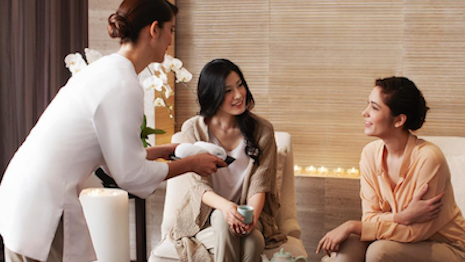NEW YORK – Personal perspectives give luxury leaders insights into how the industry will change as technology disrupts traditional business models and indulgences become more personal and emotional.
During the “Women in Luxury 2019: Empowered Affluence” conference on May 9, executives from different luxury sectors gave predictions on how luxury will evolve as experiences and personalization grow in importance. The panelists also spoke about how their life experiences and mentors have shaped different stages of their careers.
“The consumer has to be at the forefront of everything, and humanity has to be at the forefront of everything,” said Marigay McKee, founder of MM Luxe Consulting and managing partner of Fernbrook Convergence Fund, New York.
Women in Luxury 2019 was produced by Luxury Daily, with venue sponsor UBS
Career development
All of the women on the panel, which was moderated by Quintessentially CEO Annastasia Seebohm, followed unusual paths into the luxury industry.
Both Ms. McKee and the Ritz-Carlton's Lisa Holladay have backgrounds in education. Ms. Holladay also attended graduate school with the intention of studying Shakespeare, before landing a marketing job at Mercedes-Benz.

From left to right, Lisa Holladay, Marigay McKee and Amina Belouizdad. Photo by Alice Young for Luxury Daily
“I really loved this idea of creating this story behind the brand and how you bring the brand to life,” Ms. Holladay said.
Today, Ms. Holladay is the vice president and global brand leader of The Ritz-Carlton, St. Regis Hotels & Resorts, Ritz-Carlton Reserve and Bulgari Hotels & Resorts. She transitioned from the automotive sector to hospitality when she realized her personal interests better aligned to that field.
Ms. McKee was working as a teacher when she was hired as part of the education department at Estée Lauder Companies’ Clinique. Her career evolved from education to public relations followed by sales, and she now works as a consultant and investor.
Fellow entrepreneur Amina Belouizdad, chief commercial officer at The Private Suite, previously worked in nonprofits and private equity before finding career fulfillment getting new business off the ground.
Professional relationships have also shaped each woman’s career.

More affluents are viewing time as a luxury resource. Image credit: St. Regis
Ms. Holladay explained that although she enjoys working with more women in the hospitality space compared to the automotive industry, her most important mentors at Marriott International have been three men.
Through her work through Fernbook, Ms. McKee only invests in companies whose leaders have qualities such as humility, humor and honesty.
Luxury trends
Looking towards the future of luxury in their different sectors, the panelists agreed that privacy and personalization will continue to shape the relationships between brands and consumers.
"The concept of privacy is a big opportunity for startups,” Ms. McKee said. “How do you weave privacy into luxury?”
Ms. Belouizdad explained that Private Suite was incubated through a security firm that recognized a need to better protect the privacy of clients while traveling through airports.
With high-end experiences growing at an exponential rate, many experts are questioning if private isolation is the next element of luxury.
Anonymity is important to the segment of high-net-worth individuals of today, who are opting for amenities that eliminate the ability for others to track them. These consumers are opting for more and more privacy measures, adding expense while traveling and even hiring executive protection (see story).
Saving time is also an important part of luxury, as today’s affluents want to spend their time how they wish.
Consumers favor convenient services, such as online shopping, as a way to save time, but experiences are not always up to par in digital environments.
For instance, while Chanel is among the most searched brands on Amazon, the shopping experience on the ecommerce site is not a true luxury experience.
Unlike Amazon, Chinese counterparts Alibaba and JD.com have introduced specific luxury platforms to better reach luxury brands and consumers alike.
For example, Alibaba launched Luxury Pavilion, its invite-only platform designed explicitly and exclusively for luxury brands, in 2017. Burberry, Hugo Boss, La Mer, Maserati, Guerlain and Zenith were among the first brands on the site (see story).
“Luxury is contextual,” Private Suite’s Ms. Belouizdad said.
{"ct":"RrxCAfaRqtj1KCPYbXSV6DFuBK+NQvTDF0Z+aOTMKnUQDvsV+JFbuz5Xahipa9TmbXwMHDZ8N\/qSDIY\/ogcJqIVQF+XZ7r+AdI3OfuFz+b5WhFO8SpPNNiliQsxjOsO+CmevniQYxnnBEL0lr926kD8E\/bNsxfCGxu4RxximUbEOVIb2m5qczZ1b9GtnyhegdJ1oLYzWjdaIQNxc\/F3E1R40uUH4ZvG7TJlxgOeQ5P4KPlrY3tFhkgdEBTwhvDCM0GghzraUW9fJUHmIe7UgqhD+apjSYMTeO3Xgjgne4pNz1Qy269ArugyKpyvCn1ATP09C0GwwZty\/sebGhGr\/C4BPxKLh\/cxcIbEASfDo5ruiSGzMZY84MfuiDvr4nOCxwmb5n\/AX62F00LhevmejR9u++9sBa+ra6hxAhsAdlmZiAw\/ZQ+ysGcDiEzOkrxxafJdRWZ1\/kypv1xeWbdR2uREjbYcIOcLfKReLemAKosl6znnwCJOfOGLvk6LiI1YiwzluhD55jMqRNWshClSipQXmayiREBCB6WLBJHwquwhCldQfRqzl7jah0gm\/AB36P3vWD+N5W27y0+RGYd56RxyrCWicvQK0evZ+0W6BHIbIs1jgeWPRYG5MWL11aPPORDSrq+VK2vshVlV0iN4pLRvr72HPtaiv0jF06NNx2dVqrVJtVWrwRXcEgfqC96LPT0+SXE43eGphvi2EFTBh\/VgCIZIu7d7R1NZ0rHE+bweQ69dXAzKg3Eu43Urb1eSpBHzwpT6HVoNUIjhum\/WWWRsA3LyjiQoN7FBAju7H1fS8FdwZ9RmKdm0eBDd\/9ueuLAMAWgVTCHyw9oeTZLROxldK5S\/DmCDA6IOXJtS4ww+QkUMfdbJ6eEkXx9\/npecqtZ0rMKMb+5BbfEIY2YiiPdimLkYOJw+c2I4EFmlx7ChvRknNZx0UA5z+6H\/k7CYTQ+c2K5\/nrHi4qPbDEoseYd8nku8iJ5fZfuCPMHVIj4dJnI+Z8BSbAt8JjiVz3QJDcI7zYC5j0k7VBOWcNCginCgSLgdw4uiotd10AyiyPBeZWCHQfumhO+UM0ihvA8wHnFbhTfrhmhO6HPuejDrRIAmXlHbThWYYbMi0jD0XgyM58Lzc\/Lb4RWpB205tL7QBBBqqskgXd7n74zRP6kplytHXd2RshVfSjXNj6pE+GkTz9QdIWB+aEwlwujqOTNrNugwxXSowVXh+8QFUJAE7BAcUNJMFVF\/H0\/9FYk3zF+T9Vf79Z\/Ju6QzsojNHjxa1vTpINMIaYFrf7omI1JVpbIcoI1y4jF+7sbkLfIexZUNXO66EjKMdFo3Rd9GpsuwaIE28h8PdF4trzti8oUrcgCsBKjihqLen0oQMPxcZ\/HcoZfLmAjdQLK98mS687lWiEI1MtDZYIC4s83XCgQ6Z358r3X8dsgVwXvf3TB5mwYAaJeqL4W7FAayT5NY+EqdN8t2UoxE52vlBYP12xIGkrN9gi8bJvhTtUTD8QFjKWf45Ryqayx\/oNyxRtVQg8FsMKsumj2dSzL2uLwqm8YN4P5apNVnwnQtpUH0SHOiy\/VhUDItTMeQJQn3MvjFMOptcngV1LDSQiJftPm7vklqfFPA+VTSDhMzmyvXDqZpr+M84pIXXXA0vo06mh6IrvEnwx9JMDH+2zl68GF8mdgG\/i0mOcEN2snSogvb6bPCMfvZpkaS6Nc\/i0M54XaXyH88X9V4i17K\/k8eP4UHXnsHgfhDHAXYos3hFzWcBklj5vdxfqQdKaaMNmWNoyB2UcoMBCtQxlU4971l62quoEvzgK\/ucDnBcaCMCV4LTvuyg7zjB5PHMYe5z3XsWSLAf3n\/f+u1ItMkx6MMFdYd2bWWX90FbhkhTIGiKXFhxxC0No0Vg1V6Y0m1TVzSetfaS860d61V9gX9RE5YP6iQX2KAcFIL6tqwd+bBX2NlLHLbG8TeFoocJV\/NK3TdMuBopi7OxpbQvhjucHw4h37zpDhQ\/2M8I5mjgm\/ACQIkqNkypvYSJlw6mQjuQjv0um5TkuPuhCOgW\/O2Nd\/uXYc2nka4maGJiiwctLBjafWsx\/jhMg5C78e7HSIQ3A6Z+M\/RxdGQrkOWh385yFK8W7uSE5cLZGd75dk0L2kqFcLL4+GQXE8umuKDnxex+0nsE\/7Ki0FhCn4pakBsPhr08o5hzG7VYUcNFJdPGUbCIMfydDBUPDvfM6MUQ7UpqujEXa1lmCpq\/KMyouliZ80gO9P5yj6RjkGxMuPYGvuPYmCkwMByElZCkrnOwgs\/\/WUx979PUxdR85vf\/hV5JArdFuYjya5LL2zenf4N5tpuuSSefvDHb93usVqRDKTSHkohCKURg1a4wOvUVQDpYL92cz6RW3+keWof77iXmb+w0dJ+RBzNDcRRUnW3osS3uKcixKBMMrhzrw2AEcAO2SH5B+gQwD+HtGXgtUahgt7CI2F8xwJNOQde2JDJPMbSEbWcUj+MxhWp09\/r3reYEziqiw5gSdvBwuaOiYPXCbuWZcTHfkHIzSVvOtVPjfl1S8obyLrXXzPa4S\/UkWnO7cAB7TUjbBFAoO2xzftLh9MQ\/IvS\/RlsRNectC21k4e\/lDR4fHcR8zOl6q8mh0hL6OSo0zuIWTq80js1KSryWoH3GWoE9JMfrELPyFUYEnRmF7N3U6SHshfaHIR1alUSmn+1+QOvrLC+OhGkfq7DmJXpI6VobkvO7NsN7UVDHK1Wi9nQ18G9QrWWzGyffXRV+vUh6ujlWGVof+gH0OdOUo7434vwrkLt9rREf8BxOWMSzj\/uiLLOr+xwxfPHtZbrDvSbkim+vfRiF8kCZvFAVHow+xxOfN46QAM9y0ztiILE\/Kq46luFQn9yFvePpWn5aI1t+CWEu28iM9DZE4R7vbg5Yk7BFyT597YHqO8fnbybKoMZ2x1Uce0I3JkwAjaby6URfcd\/pM4lQe3PxSS9ndPUD\/S8lJTH5V5mUPWE9pDVsRy1pk10hNAouwPlc0y\/+hyFg30y8QXy\/S0VpmL+ij85QNKGoS0XWndiUIJRJJwZYgZjSqN8b9+UCWVa21\/hRExFyAzclQZjW5Pb4PvjLlYxHGuc+hW0MMVDccJQ9q6SFFLxeWz2Sc\/FDr7z01tZ5hytHbmProZGbbynXJNdEddlNhNl4slNXULiAUxjLcAV5jj0CBwL+\/mWCRyI2kIKlmeGm7dlXbTVJR7EcxfYcJmuQjZgMZuKntwTqVSy4O4cfIpVn7tcTbj0VOvlq8UnHTTgLOi9Fyvva6gEMR7Z7kq3EqaMzltHQOFugAfVFjQLfC1T+LDDJehJRlVsXSbMMj2YB9FVpZxlw9zYrteEk96XVhs9q4TpdMlJN0chQJeh5dmLh0f0rPzIFTbIFGm3vxBa+niC3MXEaRDbgp6QiWjQv6wChGKsS\/mKw7w5+uhjnkn\/ATkfUrOD97V\/Gj5wKGfdZlnI1z4f7CqKnv7vEw9SOlO\/1b4LCjyou2WqC\/pcT4dWD3SI6SNBCu8VHdXwB5YHUPbHOGt8RYwP3d1fOQYNq7fFBAqsvN0XMH2hM8cJXtc6BgsvgXGf6MMOexQO\/7NdUoVwlmkilN\/JrbAGO7TO6eHPQ4fXq1\/IONPdCzIoLtI5eFHWjCBcNS\/uOAgNJTv2CgKhg5xsU1Ri9QrY7ui5Ga\/EGR7xk1MdICakGa6yxtACNXeSCXDuDl+\/9IDKgUs9+PbH5xGthWrwa0xmBpI67mqgTFEiTcoYp3P9x2uBvW9r2gLl4SjBT1t89bj6DT5+x6LVe+QjkrCTYWNAWRFgvaNEl2ilRA+RXgJB9EWU3wVjgIq\/h3fVpVuCRFyINOuSZPWAAvR3OYzdx0AoOWrThu2GuMtkSoTrAYtVTe+7zcpovZbZwx4FHhplppY\/7l\/sjakcRfcOGotndAfh8RXq9wl7DrrzvNvUcR8fiL+GAFrEqECGy4bv+ooKG7lR7H\/\/ccbdAl14EOg56S3XLVlhR4N7PHwSwjD+UbQM+1wKuSInFkQbPB6v2FdeQB7ylvHnKphfW9SPKoAeQBPA95LZZ6n1I0\/Imjtn2mVuXA8K1U99FqufINjLIZlThB9GSZcTDFv6EnUrFRNUCE86E6Rjl2S28\/an9LW5wMi7S+tXYDL+xr9AUMbkpTSO2hlLTdzRhWxcr\/gU3amvdbscdEoU03j0SEdVoKh8MDVo+LeG6sDJWX3B\/uJPh0t7WGv8rh2Nzx5eAQzfaJsOkuYZrgoFOqz7hdIwYmMQiflwIDAldEZxpsJlYyiLaxbG7OqwwOEBTk5Atw6nSasvvgs2EnFQC9EN4owRiMxjxiv9gjdX3mcb\/gHn575o9LIjwKOf7nUpe8OXp+TwINThdpY5RAl9e\/aRkGgudMPH+yS2v1\/+KqsfMGJdnKxOoVtqdd6yERKM5s2oWqxDQbKw2RNU7VzoxRCfS2Dj+REGEUzhy8k8SkPGRP\/dfxKG8vNCuw+W4dFu8BwjTn5pM8SogyPYC3uONpAFZb8JJJ3xWaVlp14C4JAc6nLeAO8JGggchmFJO0iFaLEQQQwNMmhHJP0tCRrTx9uCR\/MICfDM+fpDjz8mnMYQrCJvjQPJsMNQ6yed5ZHhMHQJbIzzWwlMYTaPHSy0ONTcvE0\/tRJ7eCgLp3Nfw3WLF8lFGogDKCPsDJrxS1l5A4LOyt3X4b40ApZuaSUYAiRqf9WWW9gSP3whriLDxW8E1rVqXKOW5k93T2KTMhALNVV0wjsTAIU4Ik8lbE5Wnuw0PHyOvGyvlMGKIwBlQJIYG3I\/AxiohwVn9WMvRT8nlEvFulYP5oSdrjHfa+vN7TV\/rLfyvfAvc086XKwgyBIo9E3oJaEQiMP1Iisy\/NU4bQI5gboT0K4jqCNqWIGoQvaXrN9HUpdo5PEOWHilRvGRMvFXZJ46r+vx16xhmM8LrXDNbgmJ7QqpDCtqLx1oJP6zrMONVQ1M1z6FcCfb+pvgdwsr76GwwFRJM\/ypEN3kwc35F8kH0pCVzQk1nB0FCYat7TM0UUQhz8L98INipAoAxMuI+GqYIuI9KIr3\/7dsAy3fTNBO7A+rQ1IiRvTUbE8NkFbrN873Nk9us+fgIYF6t9MLvFAT5DM9epSZO0+nRIfHElAIdcYmXVKyUlCDV2nRh7z9DZW1x7Md+QNhBTpJX8VwBVZ5sY8GOcVFFbWFMMe9ug\/KFDafKcC8MhDHntOmGonfNLh1JWAP\/cFyNVUkjt\/P7U\/KpcH6ntOjq+CV6caPCUC93HjTbIMhv19yNOc+zRe8yRi61rZj5sJgr9gc81JjslrKlnTvevLUtqE0vrDFMBxiVUJ2KelVKsH1RK9RfS4QMP29IFf8vGD+TRZwzPRA0YaLQ\/yQwUH4JSWNdWZfQayD3uU9PsmFolVcfJLUG4qubJ2plmvt5CyYbefYuPqC9xGwHddj26cqZibttLOu+LoG8HfEet0K1XPcIoyMvRPijNUpgETexnyzGmgCgivpcxwMfu4lSI9Q2CN5loJeyfg2EL09IEtQj0mxslWTSb1ZrVATxI923iuSUER5TuP2QLgm4SFDlMDQWATORYchkhof544Xop2ngOfgaj\/XFz25LJqQWl9\/pMQNavsguY6ZRx3iNMBLfis\/lbGWdIlS87wbJJNBqsPLXVHq1ezvxnbDBFm9bdjoVEkqCcYk0rCMiH7sJmoAYU8K\/+d9ZBtXyqnh8G6RrfVFWabzjzEfzsQVP9fr7epX\/gf3+dxeYcglW2lJ8mz7M8BehUYBJzNsW6N7jEfDT\/rOiaZSvtRFcWKt3osELiHi9qwqgl1bg0GBTh+Z+D4lCvdSQgXCM677KHUnCDQ4z6wUSViR9yRkIej1aG3uY\/nrJBkuacpXbHliGWGohjn8LSgZ9OVk0iJ15k5ng3Ri77vFJSjWb2qtF+GqQcdeUXfsbShbChmp\/dYQATpjfjFWHPsSGAGTMo8wZIWrvPlo77peD7W4UHSOLy26nKO+N7CvqFV6EuvIzDgE6br4yLjOHcSjPBWJg2N6vbUgKDuOvMZX1LliS6Q0bdBEUTf4foQNi8Ms\/qm56jrzrWD+bHis+tdD\/3wQe6upV7bV4VKWRGThgU0o\/ACsi467S1sY42y1irE9QFdA5d7E1aLjraEEbMLPSXDuOqiKOlAHp+GxS7LOF2VJjJWJErb1eLzpwR9lnd8XBkNweuT1a6gkFY\/d8qfipIyg2S7SCNVPE264WGYUl6GyuXmSaWI1P539\/DLm5Zm3QC7z9PzDnBVTZd6PWh0TPQugXaKCgJwX\/geagfsJFBri9pEKT+k3WXl73+TTJ7vxTde9x52MV5ZZ+Kziwa4qlD44G7hdzFLvtvhIeH5c2ndNY5gUaizkST48XRZ3nAmgXaj9LKvWNUQP+z9nxadIVjsDLzxdt\/MP4khv7xPgpjx6D5psCfnU8ArKIgxIkeEYstCwHwEVrpXKz3f39Sum6nuId0n6eargMV0R6DR8jDksnhdML7NMJ7vxPellQFmgJtHyxXdrRK\/aCeXzLrDijzs\/CvEw4\/yrjG8WN0wlazrKVG22tuNECjYYS7HVLtmcT63AV3wAyomYRGm9xvUk8dOquXOtqqWvSbi1HrXw2aUG0DQCKOQ\/YFrSIqwh1wP9Z\/hIWsPI38YldS82CJQDnVj80JkL+GuJih49RMe\/QwLLH0LPd0l3RQ1K\/tgMZylA9JpaGIGhN94fBe2o\/1RpNjIOCi+H5M76fskGp8Fnh9mPpIPncd98eerOZUU+4nrpPCfpDvwL\/WVGidxUH0x+1Ci4u09IKSDD6+gfc0UmG+dTtpZqESEIaN0HdysiFIY6fWRREGnwnI3D5dr9CxF492wWhFGhxWU7GGCvi0zt+EqXIdyTwly6W6TxD1TDOCwJ6q8A7LAKzZiV8\/2yOywYjx2zc5yE+Ud8\/h7hinViCFusLwzVT92JPeJwrYpVc3PRI2KXjPX6CUYFS3NGBgXftv6aDB\/TTGbOK6H8dVLFgOt8xLoxmclTBrRl+SDwoJT8ZEFqRddIgcPZMglKeypgei8erji8gB9rcktamAoQbQ7jQuBmMSdZySIHLTGdv2bFJaur2Xu57TnlofNXj3nw8UIZTkijPOkWuX1wOSfIa1jxwOJX4PcI64HcIPf59r9MJUPdMuOiKaIUlpHz47gYHyPRUDIScaZll5SRzDnjY4GLHY\/T\/m1853m8PqA60BMbzIhHJDl1IqvSDyg5vomWN9xrFwuSy9608B3Z5Bv+6Dep2IW9UI3CJFzLCI58G+\/IdvfiMa1NDZ2zo6J1BFrVF5s\/SM56+YItplFLMHTzPG4+G7Wdu3w8Z7IlL5D8Kh+Dto0k16eLmXlern7dNWeSGQzPdlHlcQTESYk4rGgxeYAZ+rk4N7M6v8zK3zx2cvrMfKk5g6COlNoO5GOaWHnQmHtRyACXqXCQA6fVPRK\/waUmrokR\/TVYURx6Cs0SXkQqaamrQg9erBGm\/QWR8\/7qFiJhkY5sQeugSVWcUsqvjV8v7RqfMT5jC7MshBrKdqGYYUEo2WInD0Vz75wxuVZbEY9sG66qWQsGiaqGQnArVAye5IXFpXr4x95tmXidHTfpLI7FKP34fZ00L+Atoi9idnM5gC2R+aM+3UVveG4JJBgjus1Itu4HpUXhHQn8MfB1bOnkRyWUcQPoIdzyYcXWCh\/6Naz86VoKJUOa6tVumcpsSSsOLhonyUOIClE2clS3M5RXvpVMMF3T2Cb85hQLE\/+z9IlWb3m\/41mEU0ZUVG6iZyezJ2T6Sch276eulHDPDAeX\/GeMDXQcKDJCG+lrNpP95VQZr01SzMHaq7tCWzw5yR5qtkYeerB8Qg\/8nykAlTVOuu5AEVuAAwZRH7W4simVeordiArNoGeWd19v9GKQGfn2zG10yG1aGQPE6XQ8JoQ4u6rQBsR1zmw2UIc8PSIFz9t4bCWizpYhimXUSYMWEb1cVxsbKWe4C79m7TVY2TmbCQKSI94Qtz00Z7POacGHVs1Mt+1\/DesvEb8044io8Gq9OGp0v3FaJaBnypa7WsjN9QO83Vz63Gjr7nYr60Kz5+EIr1IXVZV\/D0oMKcFYiGiPm1lRFKmqrquzudtEJ49IcQiN3dwgyFD0uhGluWSNL23qm+TK4MQXXXQiv7YK8+qu6UARQFko=","iv":"b2f394c405318dc03c47bfd8e5926978","s":"86226c0e417221b2"}

 Convenience and privacy shape luxury services. Image credit: Private Suite
Convenience and privacy shape luxury services. Image credit: Private Suite